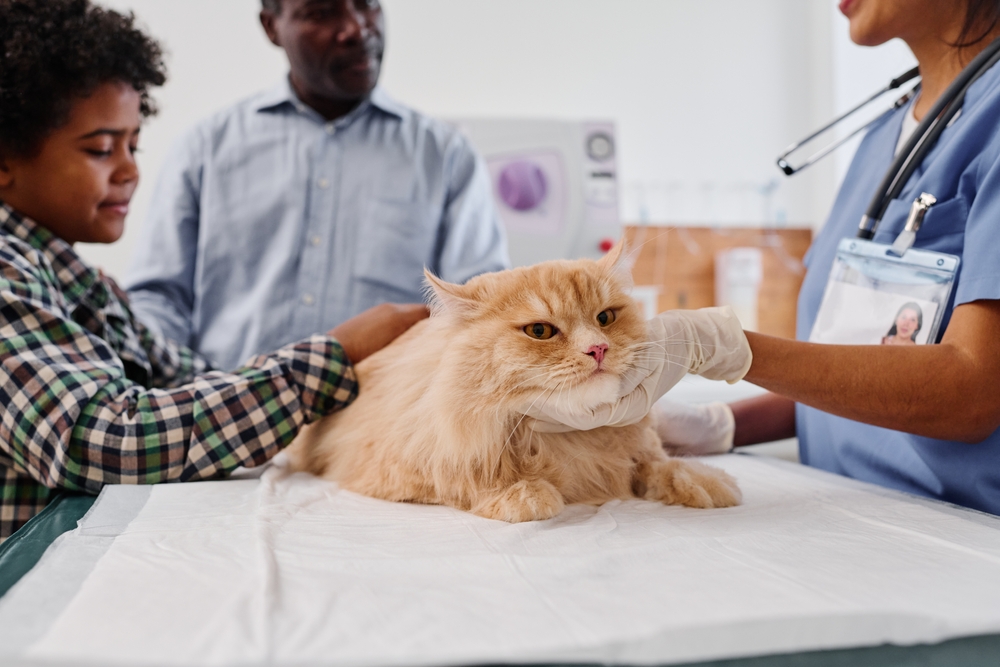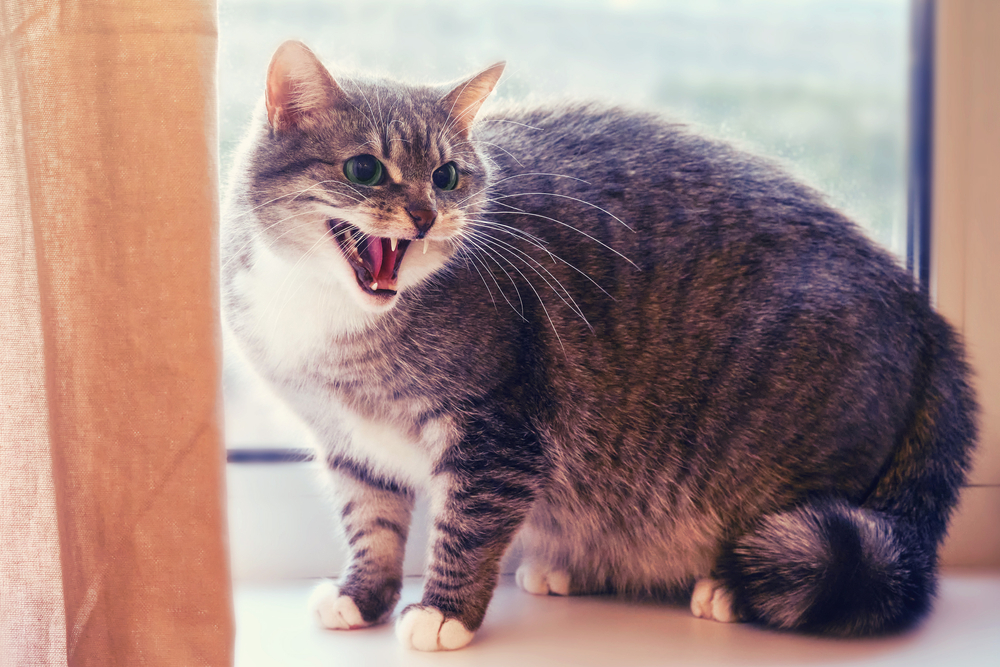At Southern Arizona Veterinary Specialty & Emergency Center in Tucson, Arizona, we hear this question all the time: “Why won’t my cat stop meowing?” A familiar voice is comforting, but constant vocalization can keep you up at night, strain household harmony, and sometimes signal a medical emergency. Together, let’s unpack why cats ramp up the chatter, what it can mean for their health, and how we can help you restore peace and quiet.
Why Cats Use Their Voices
Cats meow primarily to communicate with people rather than other cats. Kittens talk to their mothers, but adult cats quickly learn that vocalizing gets a human’s attention. In most homes this give-and-take is harmless. The trouble starts when the meows become more frequent, louder, or appear out of context.
Medical Red Flags You Shouldn’t Ignore
A sudden change in voice or frequency is often the first sign of disease. Our team sees several common culprits:
- Hyperthyroidism – Overactive thyroid glands speed up metabolism, increase appetite, and make cats restless and vocal. The Feline Hyperthyroidism Guidelines – AAHA explain the condition in depth.
- High blood pressure – Elevated pressure can damage the eyes, kidneys, and brain, producing yowls that seem to come out of nowhere.
- Cognitive dysfunction – Confusion after sunset, pacing, and nighttime howling point to brain aging. Colorado State University outlines early warning signs in Signs of Cognitive Decline in Older Pets – Colorado State University.
- Pain – Arthritis, dental disease, or abdominal discomfort cause cats to vocalize while jumping, eating, or even resting. Unsure what pain looks like? The AAHA guide What’s Wrong? Common Pet Pain Signs lists subtle clues.
- Neurologic problems – Less common, but brain tumors or seizures may trigger sudden crying. The resource Brain Tumors in Small Animals – NC State Veterinary Hospital covers available diagnostics and treatments.
Left untreated, these issues progress. Hyperthyroidism can lead to heart disease, hypertension damages eyesight, and chronic pain erodes quality of life. Early evaluation helps us prevent these downstream effects.
Behavioral and Environmental Triggers
Not every chatty cat is ill. Behavior and setting matter, too:
- Attention-seeking – If meowing delivers treats or head scratches every time, the habit sticks. AAHA’s How Can I Fix My Cat’s Behavior Problems? breaks down reward-based training that reshapes this cycle.
- Stress – New pets, houseguests, or construction noise can push cats past their comfort zone. The article Addressing Tension Among Cats suggests ways to separate resources and diffuse inter-cat stress.
- Boredom – Indoor life is safer, yet a stagnant environment invites nonstop vocalization. The Ohio State University’s Indoor Pet Initiative- Cat Environment outlines enrichment basics: vertical space, hiding spots, and interactive play.
- Normal communication – Some breeds, like Siamese or Bengals, are natural talkers. For perspective on healthier vocal behaviors, see The Secret Feline Language: 5 Reasons Why Your Cat Purrs.
Behavior problems amplify if ignored. A cat that once meowed for breakfast may progress to knocking items off shelves or developing litter-box issues, as detailed in Common Cat Behavior Issues – ASPCA.
How We Diagnose the Underlying Cause
When you schedule an exam, we start by listening—both to you and to your cat. A complete history pinpoints timing, triggers, and household changes. Next comes a physical exam: weight trends, thyroid palpation, blood pressure, and orthopedic checks. We may recommend:
- Blood and urine panels
- Thyroid hormone testing
- Blood pressure measurement
- X-rays or ultrasound if pain or masses are suspected
- Advanced imaging or neurologic consultation when indicated
Objective data guide precise treatment instead of guesswork, saving you time and your cat discomfort.
Treatment Pathways and Expected Outcomes
- Medical therapy: Hyperthyroid cats improve within weeks on antithyroid medication, diet, or radioactive iodine. Pain responds to anti-inflammatory drugs, dental care, or joint supplements. Hypertensive cats often need lifelong medication but feel quieter once pressure normalizes.
- Behavioral modification: We design a positive-reinforcement plan tailored to your schedule. Ignoring attention-seeking meows works only if paired with proactive enrichment. Puzzle feeders, timed dispensers, and scheduled play sessions help. The craft ideas in DIY Enrichment Toys For Your Cat add novelty without breaking the budget.
- Environmental enrichment: Adding shelves, cardboard tunnels, and multiple litter boxes reduces anxiety. For multi-cat homes, feeding stations and water bowls in separate rooms decrease competition.
- Nutritional support: Diets lower in iodine assist hyperthyroidism; antioxidant-rich formulas support aging brains. We tailor recommendations to lab results and lifestyle.
With consistent care, most cats settle into quieter routines within one to two months. Senior cats with cognitive decline may not become silent, but their comfort and your understanding improve dramatically.
Home Strategies: Tips and Tricks
We encourage families to keep a daily log. Note time, duration, apparent trigger, and response. Patterns emerge quickly:
- If meowing peaks at 4 a.m., try a late-night feeding puzzle.
- If it follows your video conferences, schedule a five-minute play break beforehand.
- For hallway yowling, leave a night-light on—age-related vision changes can make darkness disorienting.
When you need to redirect attention-seeking meows, avoid yelling. Instead, wait for a brief pause, then reward calm behavior—whether with treats, praise, or play. Over several days the cat learns that quiet, not noise, cues you.
Older cats often benefit from routine. Feed, play, and groom at the same times each day to create predictability. The ASPCA article Older Cats Behavior Problems – ASPCA lists additional accommodations such as low-sided litter boxes and ramps to favorite perches.
When Is It an Emergency?
Contact us immediately if your cat:
- Cries out suddenly and continuously
- Pants or struggles to breathe
- Shows dilated pupils, stumbling, or seizure-like activity
- Has abrupt blindness or bumping into objects
- Cannot urinate or defecate yet strains and vocalizes
These signs may represent heart crisis, severe hypertension, urinary blockage, or neurologic events. Rapid intervention improves outcomes and can be life-saving.

Frequently Asked Questions
Does spaying or neutering affect meowing?
Yes. Intact cats vocalize loudly during heat cycles or when searching for mates. Sterilization reduces hormonal drives and often quiets them.
Should I use a spray bottle to stop the noise?
We do not recommend it. Punishment increases stress and rarely corrects the root cause. Positive redirection is more effective.
My cat meows only when I leave the room—could it be separation anxiety?
Possibly. Try interactive feeders or hiding small treats before departing. If whining escalates, let us discuss behavior therapy options.
Can supplements help?
Certain calming pheromone diffusers or joint supplements aid specific problems, but they work best as part of a larger plan. Always check with us before starting any product.
Working Together for a Quieter Future
Our entire team cares deeply about the bond you share with your cat. Learn more about who we are on our team page and how our hospital grew to serve Tucson’s pets.
If nonstop meowing is disrupting your household, schedule a consultation through our homepage or call us directly. We’ll listen closely, investigate thoroughly, and craft a plan that supports both your peace of mind and your cat’s health.








Leave A Comment